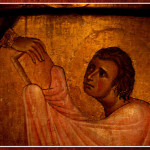We run our website the way we wished the whole internet worked: we provide high quality original content with no ads. We are funded solely by your direct support. Please consider supporting this project.

Did Yahweh Crush His Son?
Though Isaiah was probably referring to the nation of Israel as Yahweh’s “suffering servant” when these words were penned, the NT authors as well as other early church fathers interpreted this servant to be a prophetic reference to Christ. Speaking proleptically, Isaiah declares that this suffering servant was “punished” and “stricken by God” (Isa 53:4, cf., v. 8) and states that “it was the LORD’s will to crush him and cause him to suffer” (vs. 10). The passage thus seems to depict Yahweh as the one who “pierced” his servant “for our transgressions” and who “crushed” his servant “for our iniquities” (vs. 5).
At the same time, while Isaiah ascribes violent verbs to God, he also describes the suffering this servant underwent as the result of humans afflicting him. It was humans who “despised and rejected” this servant as they “hid their faces” from him (v. 3). It was before accusing humans that this servant “did not open his mouth” (v. 7), and it was violent humans who “oppressed and afflicted” this man (v. 7). So too, it was by human “oppression and judgment” that this man “was taken away … cut off from the land of the living” and “was assigned a grave with the wicked” (vv. 8-9). And it was humans from among “his generation” who failed to protest this man’s unjust treatment at the hands of other humans (v. 8). It is thus clear that for Isaiah, as much as for NT authors, Christ was “afflicted” by God only in the sense that it was God who delivered him over to violent humans to experience the death-consequences of our transgressions.
Why then does Isaiah say that the suffering servant was “punished” and “stricken by God” and that “it was the LORD’s will to crush him and cause him to suffer”? I would like to propose that the Father allowed himself to be portrayed as doing something he merely permitted for the same reason the Son takes on an appearance that makes him look guilty of crimes he merely allowed. In this case, the Father’s willingness to take on the semblance of the one who afflicted his Son is simply the flip side of the Son’s willingness to take on the semblance of one who deserved to be afflicted.
This is not to suggest that Isaiah or his original intended audience understood the matter this way. There are plenty of other passages in Isaiah that clearly reflect a pen-ultimate, sub-Christlike understand of Yahweh’s character. Isaiah clearly did not think Yahweh was above engaging in horrific violence. We can discern the humble, stooping cruciform God in the depth of these violent portraits. Here, we can also discern how God the Father was stooping to wear the mask of someone who is responsible for wrongdoings that he merely allowed, just as he does on the cross. The Creator, in other words, is taking responsibility for all that comes to pass in his creation, including the unjust suffering of his beloved servant.
Photo credit: KayVee.INC via Visual Hunt / CC BY-NC-SA
Category: General
Tags: Cruciform Theology, Jesus, Violence
Topics: Attributes and Character
Related Reading

What did Jesus mean when he said he came not to bring peace, but a sword (Mt 10:34)?
Given Jesus’ uniform teaching about loving enemies and abstaining from violence, and given that his followers were known for their refusal to engage in violence for the first three hundred years of church history, it’s obvious that Jesus wasn’t saying he came so that his disciples would use swords. The context of Jesus’ comment makes…

Part 3: Disarming Flood’s Inadequate Conception of Biblical Authority
Image by Ex-InTransit via Flickr In this third part of my review of Derek Flood’s Disarming Scripture I will offer a critique of his redefined conception of biblical inspiration and authority. I will begin by having us recall from Part I that Flood holds up “faithful questioning” over “unquestioning obedience” as the kind of faith that Jesus…

Reflections on Divine Violence in the Old Testament
As some of you know, for the last five years I’ve been working on a book addressing the problem of divine violence in the OT. (For alleged violence in the NT, see Thomas R. Yoder Neufeld, Killing Enmity: Violence in the New Testament (Baker Academic, 2011). It will be a highly academic tome, approximately 600…

Final Thoughts on Copan’s Critique of Crucifixion of the Warrior God
I want to sincerely thank Paul Copan for his well-researched critique of Crucifixion of the Warrior God (CWG) that I’ve been responding to over the last several weeks. He exposed areas in my work that needed buttressing up and/or clarifying, and he has helped introduce my ideas into the theological and philosophical marketplace of concepts…

Podcast: Can the God of Cruciform Theology Be Considered Ethical?
Divine duplicity? Or Holy Handiwork? Greg considers the imperfections of the Old Testament and considers God’s role therein. http://traffic.libsyn.com/askgregboyd/Episode_0287.mp3

Radical is in the Eye of the Beholder
Josias Hansen is a Brazilian-born, Charismatic Mennonite student at Luther Seminary in St. Paul, MN. Together with Third Way Church, Josias enjoys experimenting with what it looks like to take Jesus seriously as a jolly community of kingdom disciples. Was Jesus a radical? Did he do and teach radical things? What if I were to tell…
